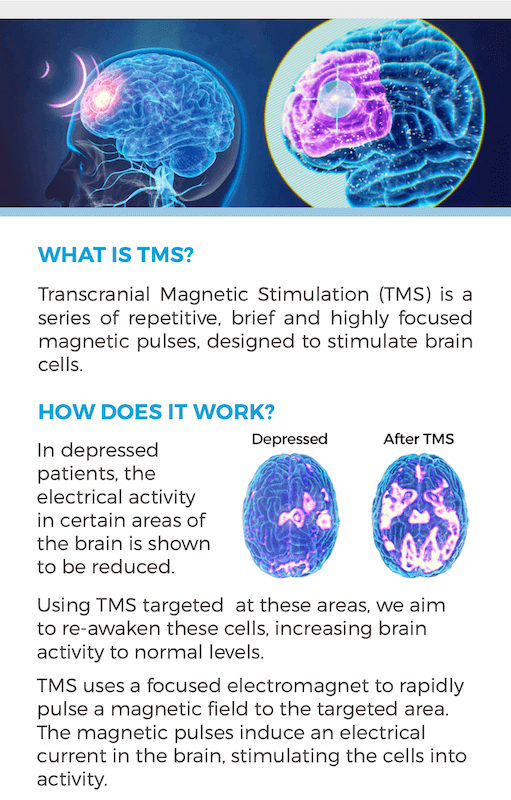Transcranial Magnetic Stimulation is a non-invasive procedure that uses magnetic fields to stimulate nerve cells in the brain in order to improve the symptoms of depression. It is our goal to provide access to effective and cutting edge treatments.
TMS is an innovative, FDA-cleared therapy for adults 18 to 70 years of age that can help people who struggle with Major Depressive Disorder.

NewVista offers TMS treatment as part of our individualized mental health and addiction treamtent to individuals who may benefit from a TMS treatment regimen. TMS is an innovative depression treatment technique that can be effective for patients who do not see impactful results from psychotherapy or antidepressants alone. TMS is a safe and effective option for depression that can be used alone or in combination with your other depression management protocols.
The goal of TMS is to stimulate the root cause of mood disorders like depression, which are often thought to be based on a disconnect of the brain’s messaging system. Some patients do not respond well to typical antidepressant treatment for depression; for these patients, TMS is a good option to try.
Rather than just treating symptoms, like medication does, TMS stimulates the actual neurons, directly targeting the brain’s networks that are assumed to be sluggish patients with depression. These treatments take place in a comfortable outpatient setting over the course of a few weeks. Patients can reap the benefits of TMS treatment from the comfort of our comfortable office space, and performed by their trusted care provider.
TMS is a treatment method that works by directly stimulating the brain’s neurons. During a TMS treatment session, magnetic pulses are applied to the scalp through a metal coil in order to reach the brain’s neurotransmitters, or messaging system. The metal coil delivers pulses non-invasively to the brain as electric currents through the coil, which acts as a magnetic field generator. Sometimes several pulses are applied in a row, called repetitive TMS treatment. Every treatment is administered by a qualified clinician.
The TMS approach to depression and other mental health disorders is different from standard antidepressant treatments because it directly activates the brain’s messaging center that is thought to be dysfunctional in disorders like depression.
NewVista works hard to make your TMS session experience as comfortable and enjoyable as possible. When you are in a treatment session, you’ll be greeted by our friendly care team. You’ll be asked to remove any magnetic-sensitive objects (such as jewelry and credit cards). Then your session takes place while you recline in a comfortable chair with a small magnetic coil resting lightly on your scalp near your forehead.
The experience will be relaxing. You may be asked to wear earplugs during treatment for your comfort and hearing protection, since the machine produces a loud clicking sound, much like an MRI machine. You can listen to music during your treatment and it usually last about thirty minutes. A typical treatment plan includes thirty-six sessions over seven or eight weeks.
The electromagnet painlessly delivers a magnetic pulse that stimulates nerve cells to the region of the brain that regulates mood control and depression. It’s thought that these areas of the brain have decreased activity in depression patients and that by stimulating them, it can increase activity in the region. When you are finished, you may immediately drive yourself home.
The stimulation is proven to be effective at minimizing depression symptoms and improving moods.The pulses are essentially nudging the brain- encouraging positive brain activity to reconnect these networks. The theory is that this will then help to create long-term relief from depression and often other mood disorders.

Side effects are generally mild to moderate and improve shortly after an individual session. They are typically the most intense after your first treatment, and decrease over time with additional sessions as your body adapts to the treatment. Common side effects of TMS stimulation are related to discomfort on the scalp and about one third of patients experience them.
TMS has not been associated with many of the side effects caused by antidepressant medications, such as, gastrointestinal upset, dry mouth, sexual dysfunction, weight gain, or sedation. This discomfort should go away after the TMS session.
According to Mayo Clinic, side effects may include:
Rarely, someone might faint or have a seizure while undergoing stimulation. Precautions are made to minimize this risk, and it is not common.

Patients with non-removable metal in their heads (excluding braces or dental fillings), should not receive TMS treatments. Metal in the head can cause the object to heat up, move, or malfunction, and result in serious injury or death.
The following is a list of metal implants that can prevent a patient from receiving TMS:
Finding a substance use treatment center is a bit tricky when you don’t know where to start. Contact us and we can walk you through our services and processes.